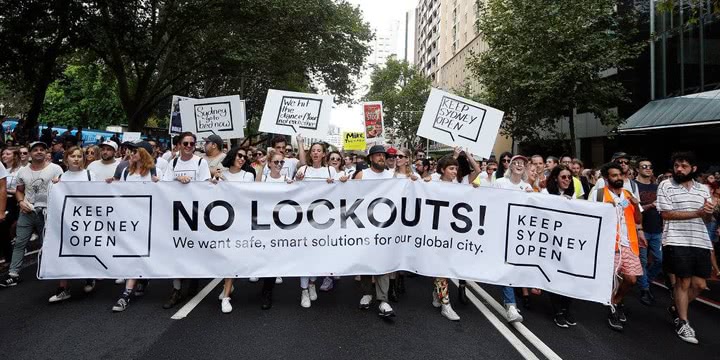Several months ago, I was attending a panel discussion on HIV prevention strategies hosted at one of Sydney’s premier gay venues, the Shift Club (formerly known as the Midnight Shift).
The panel itself was diverse, with a range of speakers from different backgrounds, genders and such. The crowd was mostly male, though that was to be expected.
I’d never been in this club during the day, so I saw many things that were otherwise shrouded in darkness or only partially revealed by skull-piercing strobe lighting. There were a couple of artworks that surprised me to see. Perhaps as to be expected, there was a stylised portrait of a handsome man, his eyes closed as if in bliss. It invited you to see the beauty of men. Another right nearby was similar, in that it again wanted to communicate male beauty, but this one was mostly all about the admiration of an idealised male body: fit, muscular and youthful. It was unapologetic in its presentation and subject matter. Its boldness somehow made it hotter. Its unabashed display of celebratory sexuality seemed to come from a place of strength.
As my eyes roved over the walls looking at artful, almost reverent representations of handsome men, my subconscious mind started to make nebulous connections. I thought of the cheaply printed signs Blu-tacked to the bathroom doors at every temporary lesbian venue that espoused self-acceptance, and startled myself with the comparison.
The contrast of tone was apparent to me. I mean, of course overt lesbian sexuality was plastered all over the place at parties catering specifically to them – images of women kissing or teasing with toys or sporting fetish gear – but it didn’t seem celebratory so much as subversive. It didn’t invite worship; it dared provocation, something that has always felt to me as stemming from insecurity.
I wouldn’t necessarily declare that I’m onto something here, but I do suspect that the way in which both groups of people deal with their respective sexualities is quite telling. The masculine is idealised and anything else is a waste of time – is temporary or silly or weak.
Queer women don’t have dedicated venues: they don’t have these places of worship, so to speak, where they can hold up their own image and revere it without having to be fucking apologetic about it.
But being socialised as a woman demands you’re apologetic for existing, so there’s that to contend with. There’s a lot of lip-flapping that goes on about female empowerment but there is little evidence of it in the queer female world. It’s rather strange to admit that, but it’s true. Queer women have much less power than queer men, on account of being, y’know, women.
Queer women have less capital and less socially-sanctioned bravado, they are expected to be sensitive and politically aware, to be otherwise is almost treasonous. When it comes to building and shaping communities, their voices are worth much less.
Queer women are stuck in a turnstile, constantly making apologies, explicitly or implicitly, it doesn’t matter. What matters is that we’ve somehow decided that being passive is fine.
Being passive doesn’t equate to pacifism and being apologetic is diametrically opposed to empowerment. An apology implies a wrongdoing. It seeks permission: it seeks to be absolved for the sake of itself. It says, “I’m sorry for existing. For wanting. For fucking. Sorry for being in the way. I’m sorry for not being sensitive to your needs.”
Therein lies the difference for me: the artwork hanging in the Shift club is so removed from passive apologetics it’s almost hilariously narcissistic. The sad, peeling posters timidly placed in temporary locations at a rented venue for queer women accurately represent how sexual shame still has them in a stranglehold they’ve become so accustomed to – they can barely feel it anymore.
This Week:
On Friday October 7, get on down to Arq because the fabulous team behind the MANCAMP show, Decoda, Rhys and Cory have returned with their newest baby, Gender Farq. It looks to be a good show and entry is free, so go check it out. I mean, come on, who could turn down the offer of some cheap thrills? Bloody nobody, that’s who.
On Saturday October 8, Heaps Gay will bring Oxford street to the Inner West (minus the lockout), with the Flamingos party hosted by the Imperial Hotel in Erskineville. Entry will be free, and Heaps Gay are known as a premier element of Sydney’s party scene, so make sure you check it out.
This one is more general focused rather than queer specific, but on Sunday October 9, Keep Sydney Open[above]have organised a rally starting at Belmore Park at noon. There will be music and marching in defence of Sydney’s endangered night time economy. If you feel like sending a message to your friend and mine, the dishonorable Mike Baird, this is the way to do it.
[Keep Sydny Open photo by Ashley Mar]


































